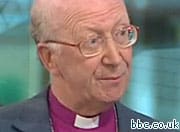Christian school assemblies should be replaced with a time of “spiritual reflection”, the Bishop of Oxford has said.
The Rt Revd John Pritchard, who is the Church of England’s head of education, said that changing the law could be “liberating” for schools and churches.
Under the 1944 Education Act, schools must conduct acts of collective worship “wholly or mainly of a broadly Christian character”.
Humanist
Bishop Pritchard’s comments were backed by the British Humanist Association (BHA), but criticised by The Daily Telegraph.
An editorial said that replacing Christian assemblies would be a “fundamental change”, adding that there is “no evidence” to show parents object to their children being exposed to Christian themes.
“Certainly the militantly atheist British Humanist Association, which opposes traditional assemblies, cannot claim to represent most parents”, the editorial said.
Values
It added that Christian school assemblies offer “a chance for children to learn that the British values of which we hear so much are based on ancient Judeo-Christian beliefs and the teachings of the Bible”.
“Why change something that has worked so well for so long?”
Bishop Pritchard said that the Department of Education, and the education world generally, should discuss the matter before a change in the law occurs.
Liberating
He commented: “At that point where society and government feel it is right I would want to go ahead with some kind of change which I think would be liberating for this very important time in the school day”.
He added, “I would want to release it into spiritual reflection”.
Bishop Pritchard said having a broad form of daily reflection, for example using silence, storytelling or music, would “take the pressure off” schools.
Pavan Dhaliwal, head of public affairs at the BHA, said: “In a plural and fair-minded society that cares about children and their development, schools should be holding inclusive assemblies that forward the spiritual, moral, social and cultural development of all pupils and staff, regardless of their religious or non-religious beliefs.”

